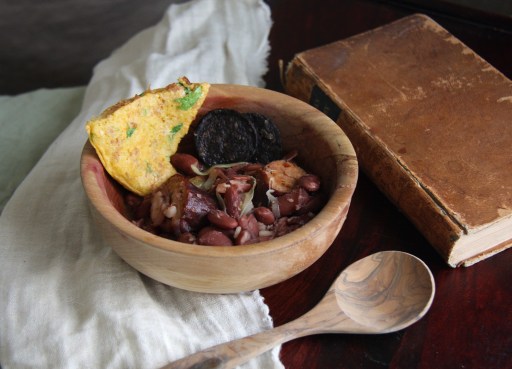
Olla Podrida
Don Quixote – by Miguel de Cervantes – 1615
“‘That big dish that is smoking farther off,’ said Sancho, ‘seems to me to be an olla podrida, and out of the diversity of things in such ollas, I can’t fail to light upon something tasty and good for me.'”
Thoughts:
Olla Podrida is a kind of Spanish stew, the base of which is usually pork and beans, but can include any variety of additional ingredients. Although the exact meaning of the name is a matter of some dispute, a fairly safe translation might be “Hodgepodge”. Such a popular dish was it in the 17th and 18th centuries that it was not only mentioned in Samuel Pepys’ diary, but also in Robert Burns’ “Ode Tae a Haggis”. Quirky!
My recipe is from a Spanish reader of the blog, but I have taken the liberty of adding leek, and tweaking the seasoning to my own tastes. The resulting the broth is relatively light, but complex and hearty, although that seems like an impossible contradiction. The spiciness of the chorizo gives it a bite that is neither instant nor cumulative. In this way you can enjoy the full flavors of the broth, followed by a long pleasant heat.
The egg, called a tortilla in Spain, is the perfect accompaniment to the stew; not quite like an omelette as we know it, nor yet quite like a fritatta, the texture is hearty, yet somehow still fluffy and reasonably light. The small amount of chorizo mixed in with the other ingredients calls to the spicy sausage in the stew, and the pairing of the tortilla along with the blood sausage makes it a meal, rather than just soup.
Olla Podrida Recipe
Prep: 1 hour Cook Time: ~2 hours
Serves 6
Cook’s Note: The stew is served alongside the blood sausage and the egg tortilla. Be careful with the salt–the chorizos and the morcilla will salt the stew fair enough but better to taste it and correct.
Ingredients:
- 1 lb. red beans, soaked in water overnight
- 1 little pig’s trotter
- 1/5 lb. Salt Pork, rinsed
- 3 chorizos
- 4 cloves of garlic, roughly chopped
- 1 leek, white part sliced thinly
- salt to taste
- 1 blood sausage, preferably Burgos Morcilla
- cumin and thyme to taste (optional)
For the egg tortilla:
- 3 eggs
- a few springs parsley
- 1 clove garlic, minced
- 1/3 cup breadcrumbs
- 1/2 cup olive oil
- Salt and paprika to taste
Soak the beans in water overnight.
Add the soaked beans, water, and all remaining ingredients except the blood sausage and filling to a stock pot, and cover with a couple fingers’ width water. Cook over low heat for an hour and a half.
Take out the trotter and the chorizo; discard the trotter and grind one of the chorizos finely. Chopp the other two chorizo into rough chunks and add back into the stew. Be careful doing so, as the sausages will be hot!
In a separate pan, beat together the eggs and the other ingredients for the tortilla, adding the ground chorizo from the step above. Scramble all of this together, and cook in a fritatta pan; if you haven’t got a fritatta pan, you can improvise flipping the tortilla with a dinner plate placed over the omelette. Cut into 6 equal slices.
Slice the blood sausage and fry in olive oil. Set aside along with the tortilla. If you would like your stew thicker, make a roux by adding just under 2 Tbs. flour to 2 Tbs. oil over medium heat. Cook until the flour turns a pretty golden color. While whisking, add a ladelful of broth to the pan- this mixture will thicken almost immediately. Add more broth until the thick roux is pourable, at which point add it back into the stew.
Season to taste, adding cumin and thyme as desired. Serve hot with the tortilla and blood sausage on the side.
Enjoy!


Olla Podrida is mentioned a lot in Don Quixote and I think you are right about the name of the dish, although Cervantes did include a footnote in early editions saying that podrida referred to ‘rotten.’
I suspect that “podrida” actually came from “poderida” to have a meaning more like substantial or heavy. Maybe this referred to the many ingredients, so more like a hodgepodge, or perhaps it was even a reference to the heavy pot laden with such a substantial stew. I don’t know when it was replaced with “podrida” but I think that Cervantes was being ironic with his play on “rotten.” The history of this dish and its name is very confusing! The French “potpourri” comes into it but I don’t think at all that the original name was meant to signify putridness, and I am sure you are right that “hodgepodge” or simply “substantial or powerful stew” is probably a better translation.
Great site and I love your domain name!
While your work on the blog is remarkable, I really do not appreciate your “tweaking” another real-life culture’s food “to your own tastes”.